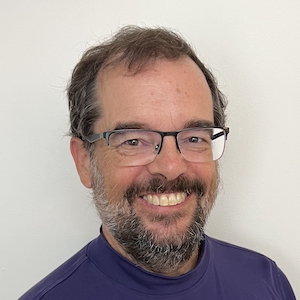About
At Trinity College, Jack is Professor of Educational Studies, where he and his students have collaborated with Hartford-area partners on education, housing, and data visualization projects since 1999.
He completed his undergraduate degree at Swarthmore College and earned his Ph.D. in educational policy studies at the University of Wisconsin-Madison. When not in front of a computer, you’ll likely find Jack on his bike in the Hartford area or on one of his longer-distance adventures.
See Jack Dougherty’s CV and Trinity faculty profile and web posts.
Additional biography
Jack received his B.A. in philosophy from Swarthmore College, taught high school social studies in Newark, New Jersey, then earned his Ph.D. in educational policy studies, with a minor in U.S. history, from the University of Wisconsin-Madison. He arrived at Trinity College in 1999 to direct the Educational Studies Program and establish its interdisciplinary major. He also co-created the Liberal Arts Action Lab and served as its first Faculty Director (2017-2020), and also led the team that launched the Center for Hartford Engagement and Research (CHER) and served as its first Director (2018-2020).
His published books include More Than One Struggle: The Evolution of Black School Reform in Milwaukee (University of North Carolina Press, 2004); Writing History in the Digital Age (co-edited with Kristen Nawrotzki, University of Michigan Press, 2013); Web Writing: Why and How for Liberal Arts Teaching and Learning (co-edited with Tennyson O’Donnell, University of Michigan Press, 2015); and Hands-On Data Visualization: Interactive Storytelling from Spreadsheets to Code (co-authored with Ilya Ilyankou, O’Reilly Media, 2021).
Currently, Jack and student contributors are completing On The Line: How Schooling, Housing, and Civil Rights Shaped Hartford and its Suburbs (under contract with Amherst College Press), an open-access book that blends historical narrative with interactive maps and video interviews. His prior publications on this topic include Shopping for Schools: How Public Education and Private Housing Shaped Suburban Connecticut (Journal of Urban History, 2012), School Choice in Suburbia: Test Scores, Race, and Housing Markets (American Journal of Education, 2009), and School Information, Parental Decisions, and the Digital Divide (book chapter, 2013). The latter two publications were co-authored with Trinity economics professor Diane Zannoni and students. Jack’s work has been supported by National Endowment for the Humanities fellowship and a National Academy of Education/Spencer Foundation post-doctoral fellowship. See abstracts and links on his Scholarship page.
For more than two decades, Jack has taught and advised hundreds of undergraduate students at Trinity, one of the nation’s preeminent small liberal arts colleges located in a city. Over 25 undergraduates have co-authored publications or co-presented papers with him at national academic conferences such as the American Educational Research Association, the History of Education Society, the Oral History Association, and the National Council on Public History. As Director of the Educational Studies Program, he has designed and taught courses such as:
- Educ 200: Analyzing Schools, an introductory course where students compare and contrast theories on learning and inequality as they gain first-hand experience through participant-observation in Hartford public school classrooms.
- Educ 300: Education Reform, Past & Present, a mid-level survey course where students develop research and writing skills while exploring parallels between historical and contemporary movements to change society through schooling.
- Educ 308: Cities, Suburbs, and Schools, a research seminar where students have investigated and published works on housing inequality, racial integration, and public school choice.
- Educ 350: Teaching and Learning, a seminar where students design and teach inquiry-based math or science lessons in Hartford elementary and middle schools
- Educ 400: Senior Research Seminar, a capstone experience where all majors design, conduct, and present their study using qualitative, quantitative, and/or historical methods.
- Data Visualization for All, a course for undergraduate students and Hartford community partners to collaborate on creating interactive charts and maps for the web, and also a free online course for learners around the globe.
Learn more on his Teaching page and his Advising page.
As the inaugural Director of the Center for Hartford Engagement and Research (CHER) from 2018 to 2020, Jack led a team of nine staff, with an annual combined budget of $1 million, to strengthen educational partnerships between the campus and the city’s diverse neighborhoods. Working together, team accomplishments included:
- launch of the Liberal Arts Action Lab, where Hartford community partners propose research questions to be answered by teams of Trinity College and Capital Community College students and faculty fellows
- startup of the Public Humanities Collaborative, a summer research program for Trinity students to partner with Hartford organizations and Trinity faculty, funded by the Mellon Foundation
- expansion of professional development for faculty who teach Community Learning courses that connect with the city
- richer assessment of the quality of Trinity’s engagement with Hartford through community partner focus groups and neighborhood resident door-to-door interviews in Spanish and English
- improved communications between campus and the community through social media, videos, and monthly newsletter
